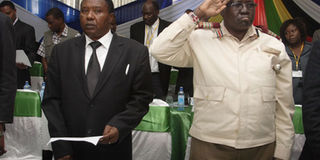Region’s fresh produce deal with EU top agenda in Arusha meeting

Regional Coordinator Francis Mutie and Erastus Ekidor Kisumu County commissioner during the official opening of the East Africa Community (EAC) Council ministers sectorial meeting in Kisumu on July 11, 2014. Representatives of the EAC member States meet on September 20, 2014 in Arusha to finalise the details on the Economic Partnership Agreements with the European Union. PHOTO| TOM OTIENO
What you need to know:
- The meeting signifies the frantic efforts the bloc is making to beat the September 30 deadline to sign the deal with the EU or else lose out on the privileges their products enjoy in the market
- Kenya says the negotiations have so far narrowed down to three from 10 issues but the region is pushing for easier taxation regimes especially on fresh produce exported to Europe
- The two blocs, however, have routinely failed to agree on a number of issues causing the deadline to be postponed time and again
Representatives of the East Africa Community member States meet on Saturday in Arusha to finalise the details on the Economic Partnership Agreements with the European Union.
The meeting signifies the frantic efforts the bloc is making to beat the September 30 deadline to sign the deal with the EU or else lose out on the privileges their products enjoy in the market.
Vegetable exports would be the worst-hit as they will be subject to up to 30 per cent of their export value in duty if the two blocs fails to agree.
On Friday, Foreign Affairs Cabinet Secretary Amina Mohammed told the Saturday Nation that the Arusha meeting would discuss the EU offers.
“We are working on it. I will be going to Arusha tomorrow and hopefully we can conclude the negotiations amongst ourselves because we have had preliminary agreements with the EU,” she said in Nairobi. “It is now more positive than it has been before.”
TAXATION REGIMES
The two sides were expected to sign the agreement by September 30 and Foreign Affairs Principal Secretary Karanja Kibicho has this past week toured Burundi and Brussels, the headquarter of the EU, to work out the issues.
Kenya says the negotiations have so far narrowed down to three from 10 issues but the region is pushing for easier taxation regimes especially on fresh produce exported to Europe.
The country is championing for a flexible regime to enable it introduce preventive measures especially in times of drought, without burdening the farmers.
Kenya would have chosen to negotiate alone with the EU, but the country opted to bring in the bloc in what it argues would help build the pace of regional integration.
DEVELPOMENT SCALES
A week ago, Dr Kibicho told reporters in Nairobi that part of the delays resulted from the fact that EAC member States fall on different scales of development.
“Signing of the EPAs must not kill our desire for regional integration that we have worked so hard to get where we are,” he said.
“One of the challenges is that we are negotiating as a group with countries belonging to the LDC (Least Developed Countries). To them, it is not urgent as it is to us.
“This is a delicate balance because we don’t want to have a situation where we have two systems in the East African Community, where some countries are LDC and Kenya is not.”
KENYA'S UNDOING
Yet Kenya’s desire to go on its own could be its undoing. The Arusha meet will be the third time the bloc member countries are meeting to work out the issues of taxation, governance and subsidies.
There has been suspicion that some EAC members are reluctant to sign because they won’t be affected after all. Under the Everything but Arms agreements, LDCs are allowed to duty-free access to most EU markets.
They also enjoy duty-free quotas on some food items until they get out of the category.
Negotiations for the EPAs between the EAC and the EU started seven years ago with an initial framework EPA agreed in November 2007.
The two blocs, however, have routinely failed to agree on a number of issues causing the deadline to be postponed time and again.




